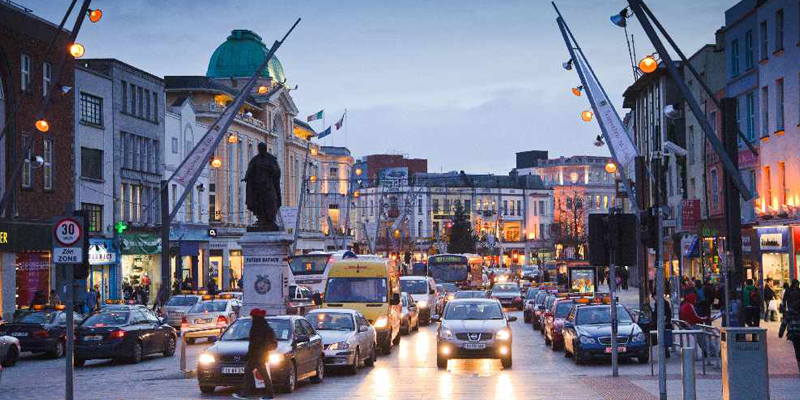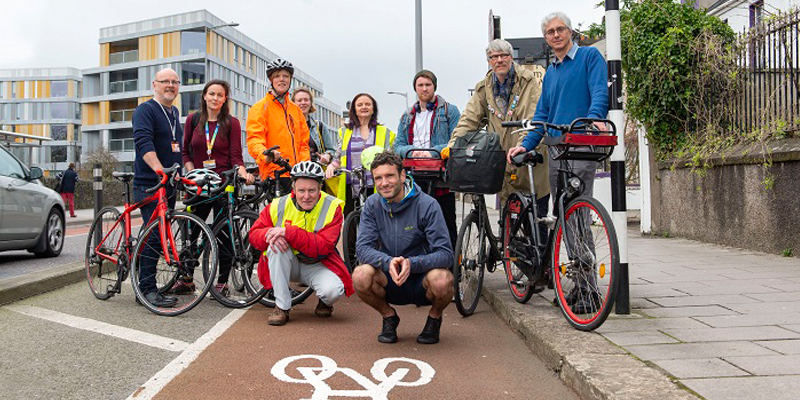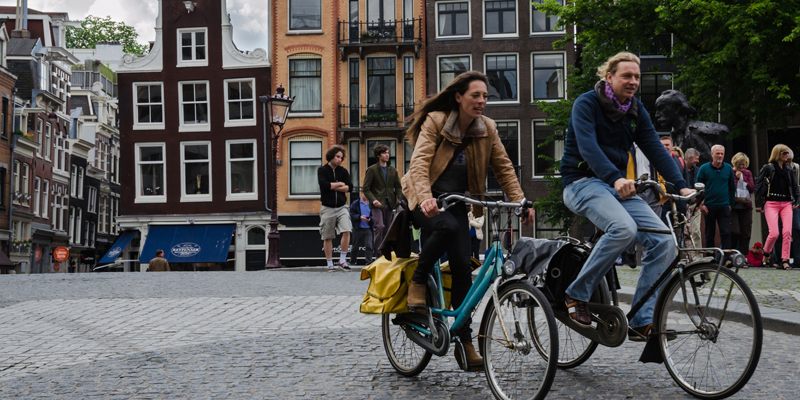In This Section
Media Watch | Cork Must Follow Amsterdam and Become a Cycling City

Cities across Europe are aiming to make themselves more people-friendly and less car-centric in a bid to reduce emissions and air pollution and increase emission-free travel.
The issue of air pollution in cities, mainly caused by cars and other diesel and petrol engines, across the globe has made headlines in recent months. Scientists and climate change activists have warned that things must change or the health of the planet and its people are at risk. Here in Cork, an air pollution expert recently called for more air monitoring in the region following reports of dangerously high levels of nitrogen dioxide in Dublin.
A report from the Environmental Protection Agency (EPA) found that Dublin is in danger of breaching EU limits on safe nitrogen dioxide levels. The EPA report suggested that a rise in traffic is the cause of increased air pollution in Dublin. Professor John Sodeau of the Centre for Research into Atmospheric Chemistry at UCC warned that health services will be impacted unless action is taken to reduce air pollution. "To attack the full air pollution problem," he said, "we need much better, frequent, clean public transport in Cork. But that is in politician’s gifts. If that does not happen then increasing calls on health services will be made," he warned.
The UCC Emeritus professor also revealed that increased levels of air pollution have been recorded in a Cork town after students returned to school, bringing with them an increase in the number of cars on the roads. An air monitoring station in Cobh recorded an increase in the level of air pollution this week, coinciding with the reopening of schools in the area following the summer holidays. Professor Sodeau explained that schools are often "hotspots" for toxic air pollutants emitted from car, truck and bus exhausts. The calls for increased air monitoring, clean public transport and better cycling infrastructure have come thick and fast in recent months.
“Creating a speedy corridor for diesel guzzling buses appears to be the Holy Grail for planners in City Hall.” https://t.co/ezeqxwLezy
— John Sodeau (@JohnSodeau) September 15, 2019
Amsterdam, a city famed for its cycling infrastructure, is the latest to aim for a car-free and engine-free city centre. Cars and motorbikes with petrol or diesel engines will be banned from driving in the Dutch city from 2030. The city plans to phase in the change are part of a drive to clean up air pollution. Diesel cars that are 15 years or older will be banned from near Amsterdam from next year while buses that run on petrol or diesel will be banned by 2022. By 2025, the ban will be extended to boats and mopeds, and all traffic within Amsterdam must be emission-free by 2030. Amsterdam plans to encourage its residents and tourists to switch to electric or hydrogen-powered vehicles and has even offered charging stations to every buyer of such a vehicle. There are those that would say Cork, and other cities across Ireland and the world, need to follow this example. But, according to some, it seems that the car is still king in Cork.
Professor John Sodeau said Amsterdam could not be more different to Cork in terms of its prioritisation of people over cars. He praised previous initiatives aimed at improving flow in the Dutch Capital, adding: "Now the city is getting even more radical with a plan that does not have car traffic flow a priority at all. Instead it is going to ban cars due to high levels of air pollution and congestion. Their decision is not out of line with many other cities in Europe," he said. "How different that is from Cork city where no roadside air monitoring is undertaken in real-time. If the information is available then it’s not readily accessible to the public."
"If we don’t know the pollution levels people cannot make sensible decisions about visiting the city to shop, especially if asthmatic or suffering from cardiac problems," he added. "Creating a speedy corridor for diesel guzzling buses appears to be the Holy Grail for transport planners in City Hall. Cyclists and walkers are very much an afterthought with poor quality road surfaces and lack of pedestrianized areas a reward for them not contributing to poor air quality. This all may change in 2020 if the council does publish an air quality plan that includes a de-prioritisation of cars, buses, trucks and taxis. An electrified public transport system is a must to give Cork safer air but we are not living in Amsterdam so I’m not holding my breath."
Dr Dean Venables, lecturer in Physical Chemistry at University College Cork and chair of the Cork Cycling Campaign, explained: "In Cork, we still have a city centre dominated by old-style design where cars are more important than people. For instance, if you look at Pana on Google maps, the road and parking takes more than half the available space in places. In other words, much of Cork's principal shopping street is simply given over to vehicles sitting idle," he said. That is hugely valuable land - let people enjoy it instead! That parking space could be used for trees and street furniture, stalls and displays, and outside seating for restaurants. Doing so would bring an even greater buzz to the area, making it even more attractive to visit and shop there.”

Dr Venables explained that Amsterdam and the Dutch have always been leaders in providing for cycling infrastructure. "But it's important to stress that their plan is part of a larger discussion and rethinking of urban spaces,” he said. "This is happening in many cities around the world. "Cities like Leipzig in Germany have already embraced essentially car-free centres,” he added. "The result is a welcoming, comfortable public space that draws in large numbers of people and becomes a huge asset for the city."
"Urbanists and town planners are now coming to accept that urban spaces should be designed principally for people," said Dr Venables. "In the past, cars and trucks were prioritised above all other users of the space. "While vehicles have some role in urban mobility and are needed for deliveries, they waste a huge amount of physical space, pollute the air, and transport people inefficiently. "Pedestrians and cyclists should have priority, along with efficient public transport."
Conn Donovan, a member of the Cork Cycling Campaign and teacher in Cork, said Amsterdam should not be vilified for its radical change, but followed as an example. "Amsterdam is taking drastic action as it estimates that air pollution is shortening the life expectancy of people living in the city by a year. "It's a conversation we should really be having too in Cork,” he added. "If a parent put a cigarette into their child's mouth and lit it up, there would be outrage. "However, when a group of parents park outside a school, sports club or community centre and leave their engines running, the health effects are not dissimilar for the children in the vicinity."
Air pollutants have been linked with a wide range of health impacts and unfortunately, children are particularly at risk, explained Mr Donovan. "Children living in highly polluted areas in cities are four times more likely to have reduced lung capacity as adults. "Children living near a major road have a 30% increased risk of developing asthma. "Children exposed to air pollutants over the long term have higher blood pressure. "These are just three examples of the countless types of health effects that air pollution, mostly traffic-related causes," he said.
While the Cork Metropolitan Area Transport Strategy may have 'ambitious' targets for a modal shift towards public transport and walking, Mr Donovan said that, unfortunately, due to population growth, there will be an additional 65,000 daily car movements happening in Cork by 2020 compared to now. "Some of those cars will be electric so wouldn't have tailpipe emissions but the UK's chief air pollution adviser has recently warned that even electric cars produce large amounts of pollutants due to tyre and brake dust," he added. "If you are thinking, I drive in the city but live in the countryside so this doesn't affect me, unfortunately, it does. "People in cars experience some of the highest exposures to air pollutants due to waiting in traffic," he said. "Once we get more air quality monitoring stations up and running in the city centre, I think the gravity of the situation will hit home for a lot of people. Efforts to get people to walk, cycle, or scoot to work will hopefully significantly improve."

"You can brand a city all you like but people will ultimately compare the pollution in Cork with other cities and think, 'is this somewhere I want to live and work?" Despite the fact that the car seems to be king in Cork, for the moment at least, Dr Dean Venables said he is optimistic that the city is moving in the right direction. "The afternoon bus corridor has helped make Pana more pleasant to visit and is critical in transporting people efficiently through the city," he explained. "It should be extended throughout the day. "We have made progress," he added. "I recently saw a photo of Pana in the 1960s showing that even more space had been given over to roads and parking back then. "We also must not forget that eliminating cars during the day made Oliver Plunkett one of Ireland's most attractive shopping streets. "It has a great vibe," said Dr Venables. "Although more could be done there too, and none of the parking on it is really necessary. "It could be fully pedestrianised except for early morning deliveries."
"The Dutch have progressed much further away from private vehicle use and Cork should note how leading cities are starting to reimagine their public spaces," he added. "The trend is clearly away from private vehicle use and on-street parking, and towards providing more pedestrianised areas and promoting walking, cycling, and public transport as principal modes of transport. "With all the new office blocks coming on stream over the next few years, Cork has a fantastic opportunity to deliver a really exciting, vibrant city centre that puts people first. "Doing so would make Cork a really fantastic city to visit, and to live and work in."
This article appeared in The Evening Echo on 15th September 2019.
School of Chemistry
Scoil na Ceimic
Contact us
Second Floor, Kane Building, University College Cork, T12 YN60
